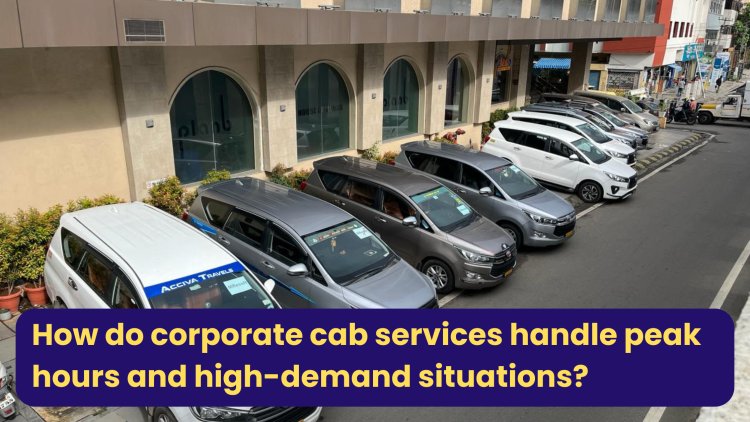How do corporate cab services handle peak hours and high-demand situations?
A corporate taxi service is an integral part of a cost-effective office transportation strategy in the current demanding business environment.
Share this Post to earn Money ( Upto ₹100 per 1000 Views )

Introduction:
A corporate taxi service is an integral part of a cost-effective office transportation strategy in the current demanding business environment. These services offer more than just rides; they are a vital part of maintaining productivity and ensuring smooth operations. One of the most challenging aspects of managing a corporate cab service is handling peak hours and high-demand situations. Here’s a closer look at how these services navigate these complexities to keep their operations running smoothly.
Strategic Fleet Management:
One of the primary strategies corporate cab services use to handle peak hours is strategic fleet management. This involves using data analytics to predict peak times and adjust the fleet size accordingly. By analyzing historical data, such as traffic patterns, booking trends, and special events, services can forecast high-demand periods and ensure they have enough vehicles on the road.
For instance, during major business conferences or city-wide events, a sudden surge in demand can be anticipated. Corporate cab services often increase their fleet temporarily to accommodate the influx. This proactive approach ensures that employees are not left waiting, and service levels remain high even during busy periods.
Real-Time Tracking and Optimization:
Technology plays a significant role in managing high-demand situations. Corporate cab services use sophisticated GPS tracking systems and real-time data analytics to optimize routes and manage their fleet effectively. Real-time tracking helps in several ways:
Dynamic Routing: By analyzing current traffic conditions and route availability, cab services can dynamically adjust routes to avoid congestion and reduce travel times.
Efficient Dispatch: Real-time data allows dispatchers to allocate the nearest available cab to a request, reducing wait times and ensuring quicker response times.
Predictive Analytics: Advanced algorithms predict potential surges in demand based on various factors, such as weather conditions, special events, or even time of day. This helps in adjusting the fleet size and dispatch strategies accordingly.
Improved Booking Systems:
During peak hours, a streamlined and user-friendly booking system becomes crucial. Corporate cab services invest in robust booking platforms that can handle high volumes of requests without compromising on efficiency. Features of these systems include:
Priority Booking: For frequent or high-priority users, services may offer priority booking options, ensuring that critical trips are accommodated even during peak times.
Automated Scheduling: Advanced booking systems often come with automated scheduling capabilities, allowing users to book rides in advance and helping the service to plan its fleet deployment more effectively.
Load Balancing: These systems can balance the load by directing requests to different areas or times based on real-time demand and supply data.
Customer Communication and Support:
Clear communication is key to managing expectations during high-demand periods. Corporate cab services ensure that their customers are well-informed through:
Real-Time Updates: Customers receive updates on their ride status, including estimated arrival times and any delays. This transparency helps in managing expectations and reduces frustration.
Dedicated Support Teams: During peak hours, having a dedicated support team available to address customer concerns and handle any issues that arise is crucial. These teams can provide immediate assistance and resolve problems quickly.
Feedback Channels: Encouraging feedback helps services understand customer experiences and make necessary improvements. Implementing a system for quick resolution of complaints and suggestions is essential for maintaining high service standards.
Flexible Vehicle Options:
To cater to different needs during peak hours, corporate cab services often provide a range of vehicle options. This flexibility ensures that clients can choose the type of vehicle that best suits their requirements. Options may include:
Standard Cabs: For regular commuting needs.
Luxury Vehicles: For high-profile clients or important meetings.
Shuttle Services: For transporting groups of employees to and from corporate events.
By offering a variety of vehicles, services can better manage demand and ensure that every customer’s needs are met effectively.
Collaboration with Other Transportation Modes:
In some cases, corporate cab services collaborate with other transportation providers to manage peak demands efficiently. For example:
Public Transit Integration: Partnering with public transportation systems to offer combined services or coordinated schedules can help manage overflow during peak hours.
Ride-sharing Partnerships: Collaborations with ride-sharing platforms can provide additional resources and options for handling high demand.
Employee Training and Management:
Finally, the effectiveness of corporate cab services during peak hours is also dependent on the training and management of drivers. Ensuring that drivers are well-trained in inefficient route navigation, customer service, and crisis management is essential. Regular training sessions and performance evaluations help maintain high standards of service even during the busiest times.
Conclusion:
Handling peak hours and high-demand situations is a complex but crucial aspect of managing corporate cab services. By leveraging strategic fleet management, real-time tracking, advanced booking systems, effective communication, flexible vehicle options, and collaborations with other transportation modes, these services can navigate the challenges of high demand efficiently. With a focus on customer satisfaction and operational excellence, corporate cab services continue to play a vital role in supporting the dynamic needs of modern businesses.

 accivatravels
accivatravels 













